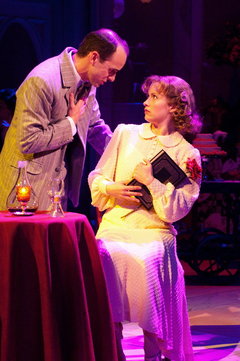It’s become chic in literary circles to celebrate June 16 as Bloomsday, the date on which the events chronicled in James Joyce’s Ulysses supposedly took place in Dublin. But celebrations notwithstanding, the fact remains that Ulysses is more admired than read–and that Finnegans Wake, Joyce’s other major novel, isn’t even read. Few people are prepared to grapple with its fantastic verbal complications, any more than they’re prepared to grapple with the musical hypercomplexities of an exercise in atonal modernism like Pierre Boulez’s Le marteau sans maître.
 I thought of Joyce at once when a musician friend drew my attention the other day to a 1988 paper by Fred Lerdahl called Cognitive Constraints on Compositional Systems. Lerdahl, a tonal composer who has studied cognitive psychology, believes that certain kinds of modern music are too complicated for the human brain to process, and will therefore never find an audience. It immediately occurred to me when I read his paper that the same inborn limitations on intelligibility might apply to practitioners of other art forms–and no sooner did I come to that conclusion than I felt the first stirrings of a “Sightings” column for The Wall Street Journal.
I thought of Joyce at once when a musician friend drew my attention the other day to a 1988 paper by Fred Lerdahl called Cognitive Constraints on Compositional Systems. Lerdahl, a tonal composer who has studied cognitive psychology, believes that certain kinds of modern music are too complicated for the human brain to process, and will therefore never find an audience. It immediately occurred to me when I read his paper that the same inborn limitations on intelligibility might apply to practitioners of other art forms–and no sooner did I come to that conclusion than I felt the first stirrings of a “Sightings” column for The Wall Street Journal.
Are our brains simply not big enough to process the prose of Joyce or the music of Boulez? And if not, then why have such similarly complex artistic creations as the drip paintings of Jackson Pollock succeeded in finding an appreciative popular audience? To find out, pick up a copy of Saturday’s Journal and see what I have to say.
UPDATE: Read the whole thing here.
* * *
James Joyce reads an excerpt from Finnegans Wake:
Archives for June 2010
TT: In love with She Loves Me
In today’s Wall Street Journal drama column I report on two more shows from the Oregon Shakespeare Festival, She Loves Me and The Merchant of Venice. I was thrilled by one but didn’t warm up to the other. Here’s an excerpt.
* * *
 For a cult show, “She Loves Me” sure gets done a lot. I know of two revivals taking place this year, one which closed last month at Connecticut’s Westport Country Playhouse and another that runs through October at the Oregon Shakespeare Festival, and I expect there are others of which I haven’t heard. I trust they’re all worthy, but the OSF production of “She Loves Me,” directed by Rebecca Taichman, is special in every way, a near-flawless realization of one of the most delightful musicals of the 20th century.
For a cult show, “She Loves Me” sure gets done a lot. I know of two revivals taking place this year, one which closed last month at Connecticut’s Westport Country Playhouse and another that runs through October at the Oregon Shakespeare Festival, and I expect there are others of which I haven’t heard. I trust they’re all worthy, but the OSF production of “She Loves Me,” directed by Rebecca Taichman, is special in every way, a near-flawless realization of one of the most delightful musicals of the 20th century.
First seen on Broadway in 1963, “She Loves Me” is based on “The Shop Around the Corner,” Ernst Lubitsch’s 1940 screen version of “Parfumerie,” a Miklós Laszló stage comedy that was later filmed as “In the Good Old Summertime” and “You’ve Got Mail.” The setting is prewar Budapest and the plot is a clockwork farce: Amalia and Georg, two love-starved members of what used to be called a “lonelyhearts club,” are sending each another anonymous mash notes without ever having met….
The word “endearing” can sound saccharine, but it fits “She Loves Me” as tightly as the skin on an apple, and one reason why this revival is so easy to love is the way in which it is cast. Instead of picking a pair of pretty-pretty stars, Ms. Taichman has gone in a different direction: Georg is played by Mark Bedard, who is balding, bespectacled and sharp-faced, while Lisa McCormick, who plays Amalia, is an eagerly fluttering sparrow who is charming but not glamorous. You don’t have to strain to see the two of them as a pair of wallflowers who make each other blossom….
Ms. Taichman is best known to New York theatergoers for her staging of the 2007 Off Broadway premiere of Theresa Rebeck’s “The Scene.” I had no idea that she would be similarly adept in musical comedy, but her collaboration with choreographer John Carrafa (who staged the musical numbers for the original production of “Urinetown”) is seamless and scintillating. Songs and dialogue are woven together indissolubly, and each scene is played not for laughs but for truth–which means that the laughter comes from the heart….
Everybody wants to do “The Merchant of Venice,” but few directors are prepared to grapple forthrightly with the play’s gnarly side. The Oregon Shakespeare Festival’s new production, staged by Bill Rauch and performed in the company’s Elizabethan-style outdoor theater, leaves nothing to be desired in this respect: It abounds with racial stereotypes, all of which are presented unapologetically. The staging is full of sharp comic twists, and one of the performances, that of Anthony Heald as Shylock, is impressively pointed and lively. Yet the divine spark is missing…
* * *
Read the whole thing here.
TT: Almanac
“Almost every wise saying has an opposite one, no less wise, to balance it.”
George Santayana, “Reason in Ethics”
TT: So you want to see a show?
Here’s my list of recommended Broadway, off-Broadway, and out-of-town shows, updated weekly. In all cases, I gave these shows favorable reviews (if sometimes qualifiedly so) in The Wall Street Journal when they opened. For more information, click on the title.
Warning: Broadway shows marked with an asterisk were sold out, or nearly so, last week.
BROADWAY:
• La Cage aux Folles * (musical, PG-13, adult subject matter, reviewed here)
• Fela! * (musical, PG-13, adult subject matter, reviewed here)
• Million Dollar Quartet (jukebox musical, G, reviewed here)
• South Pacific (musical, G/PG-13, some sexual content, brilliantly staged but unsuitable for viewers acutely allergic to preachiness, closes Aug. 22, reviewed here)
OFF BROADWAY:
• Alfred Hitchcock’s The 39 Steps (comedy, G, suitable for bright children, original Broadway production reviewed here)
• Avenue Q (musical, R, adult subject matter and one show-stopping scene of puppet-on-puppet sex, reviewed here)
• The Fantasticks (musical, G, suitable for children capable of enjoying a love story, reviewed here)
• Our Town (drama, G, suitable for mature children, reviewed here)
IN ASHLAND, ORE.:
• Hamlet (Shakespeare, PG-13, closes Oct. 30, reviewed here)
• Ruined (drama, PG-13/R, violence and adult subject matter, closes Oct. 31, reviewed here)
IN CHICAGO:
• The Farnsworth Invention (drama, G, too complicated for children, closes July 24, reviewed here)
• Killer Joe (black comedy-drama, X, extreme violence and nudity, closes July 18, reviewed here)
IN GLENCOE, ILL.:
• A Streetcar Named Desire (drama, PG-13, adult subject matter, extended through Aug. 8, reviewed here)
CLOSING SOON ON BROADWAY:
• Fences * (drama, PG-13/R, adult subject matter, closes July 11, reviewed here)
CLOSING NEXT WEEK IN EAST HADDAM, CONN.:
• Annie Get Your Gun (musical, G, child-friendly, closes July 3, reviewed here)
CLOSING NEXT WEEK IN PHILADELPHIA:
• Sunday in the Park with George (musical, PG-13, far too complex for children, closes July 4, reviewed here)
CLOSING SUNDAY OFF BROADWAY:
• That Face (drama, PG-13, not suitable for children, reviewed here)
TT: Almanac
“A facility for quotation covers the absence of original thought.”
Dorothy L. Sayers, Gaudy Night
TT: Snapshot
A performance of Martha Graham’s Appalachian Spring, choreographed in 1944 and filmed in 1959 by Peter Glushanok. The score is by Aaron Copland and the set is by Isamu Noguchi. Graham dances the role of the Bride:
(This is the latest in a weekly series of arts-related videos that appear in this space each Wednesday.)
TT: Almanac
“Most people are other people. Their thoughts are someone else’s opinions, their lives a mimicry, their passions a quotation.”
Oscar Wilde, “De Profundis”
CAAF: Afternoon coffee
A couple enjoyable things:
• Tom & Lorenzo’s series on the fashion of “Mad Men”, a detailed look at the costumes of the different characters. If I were costume designer Janie Bryant I’d be over the moon about it — they are picking up everything she is laying down.
• Another bookmark: Schott’s Vocab blog, which is doling out a “lexicographical trifle” a day with an assist from the OED. Elsewhere on the word geekery front, I love this Language Log theory that pegs basketball player Manute Bol as the originator of the phrase “my bad.” Also: Team Snuck. (More here.)
